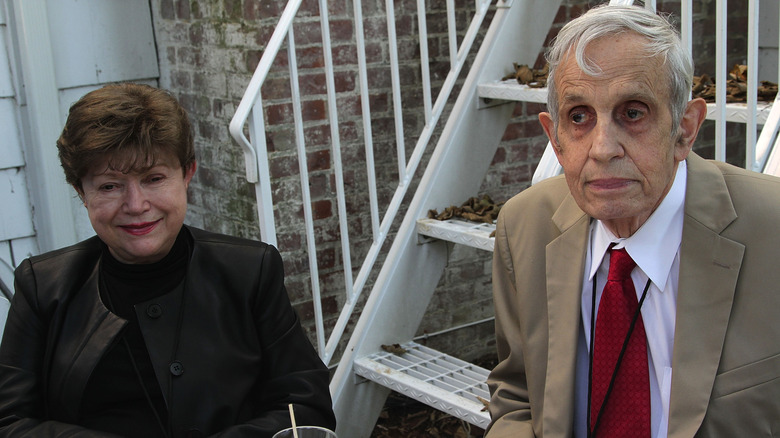The True Story That Inspired A Beautiful Mind
If you were told at the turn of the 21st century that one of the biggest hit movies in the years that followed would be a psychological drama based on the life of the Nobel Prize-winning mathematician John Nash, you may have understandably been skeptical. It's true that more than 20 years ago, blockbusters weren't quite as immense as today's Marvel offerings, but millennium audiences had just been treated to the eye-popping spectacle of "The Matrix" –- did audiences really want an insight into the inner turmoil of a troubled academic, titled "A Beautiful Mind"?
The answer is a resounding yes, likely because of two factors. The first is the involvement of Russell Crowe, who, hot off the back of his name-making performance in Ridley's Scott's historical epic "Gladiator," was suddenly everyone's new favorite actor. And the second was the fact that the real story of John Nash is as incredible as it appeared on screen –- though a few key details didn't quite play out as they did in Ron Howard's movie, which incidentally grossed more than $313 million, according to Box Office Mojo.
And there was one thing that it would have been impossible, of course, for the movie to depict: the death of John Nash, which occurred alongside that of his wife in horrifying circumstances in 2015.
The real life of John Nash
The brilliance of John Nash's early career and the tragedy of his growing mental health problems as represented in "A Beautiful Mind" are indeed true to life. Born in Bluefield, Virginia, on June 13, 1928, Nash really was only 21 years old when, as a student at Princeton University, he penned the groundbreaking work on game theory for which he would receive the Nobel Prize some 45 years later, according to his biography on the Nobel Prize website.
Nash wrote: "The mental disturbances originated in the early months of 1959 at a time when Alicia happened to be pregnant." As noted by Bright Side, Nash had begun experiencing the symptoms of schizophrenia, a disorder that he dealt with for the rest of his life. "A Beautiful Mind" portrayed Nash as experiencing vivid visual hallucinations; In fact, Nash's symptoms were auditory.
By the mid-'60s, Nash separated from his first wife, Alicia, while he was undergoing treatment, becoming estranged from his son in the process. Tragically, Nash's son also went on to develop schizophrenia.
Bright Side also notes that in the climate of the Cold War, Nash's paranoia led him to identify red ties as a sign of Communist sympathies. Later, he proposed an encryption machine to aid the National Security Agency, as explained in letters held in the NSA's files.
On May 23, 2015, Nash died in a car crash alongside Alicia, according to The New York Times. The couple had remarried in 2001.

